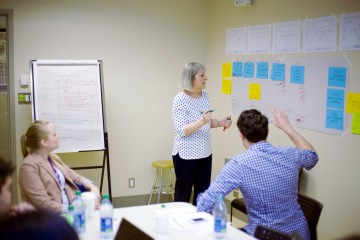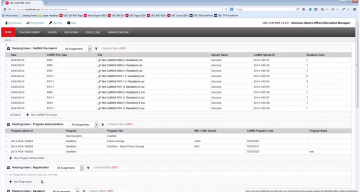In 2013, the administrative staff for Postgraduate Medical Education (PGME) came to MedIT with a problem: they didn’t have the appropriate tool to facilitate the management of resident information. Between two separate systems and five sets of paper records, there were so many redundant processes and so much paperwork that the demand on staff was unsustainable. The potential for human error was high, and there was unnecessary duplicate effort required from both staff and residents.
They needed a faster, easier, and more reliable way to manage resident information. More importantly, with over 60 post-graduate programs across the province, they needed a solution that worked for the programs’ unique needs and challenges.

Process before technology.
Recognizing that it wasn’t simply a matter of buying new software, MedIT’s Program Management Office and PGME worked together to create a Business Working Team to guide the design of new business processes and complementary tools. Comprised of ten administrative representatives from small to large PGME programs and the Faculty of Medicine Dean’s Office, and one MedIT operations representative, the team provided their insight to defining a new solution that would work best for their group.
Guided by a MedIT project team, the Business Working Team analysed the existing state of resident management in PGME, identifying gaps in the process and essential requirements for a new system. They worked to standardize their core business processes and develop a “common business language” – a set of agreed upon definitions for business terms. They continued to work together through the technology selection process, eventually unanimously selecting MicroPact’s entellitrak® as the appropriate platform.

A system demonstration is available
on the Resident Management project site.
The new system faced its first test this summer with the launch of resident registration on June 9. It was a major success for the Business Working Team and PGME as a whole. Residents used their Campus-Wide Login to register, eliminating the need for a separate username and password. Electronic contracts with electronic signatures were generated, improving efficiency and reducing paper waste. Any residents who had not registered ten and three days prior to the deadline received automatic reminders to do so. One of the biggest successes was that MedIT and PGME were able to work together to have registration operational within four months of the contract for the system being signed.
Through the fall, new administrative processes will continue to be introduced, many of which help PGME to address accreditation requirements. The Business Working Team will continue to play a critical role through the introduction of these new processes as they help to support staff in their programs through the training process.
By enabling the Business Working Team through technical and project management expertise, MedIT is helping PGME to more efficiently and sustainably support residents across BC.
Related: